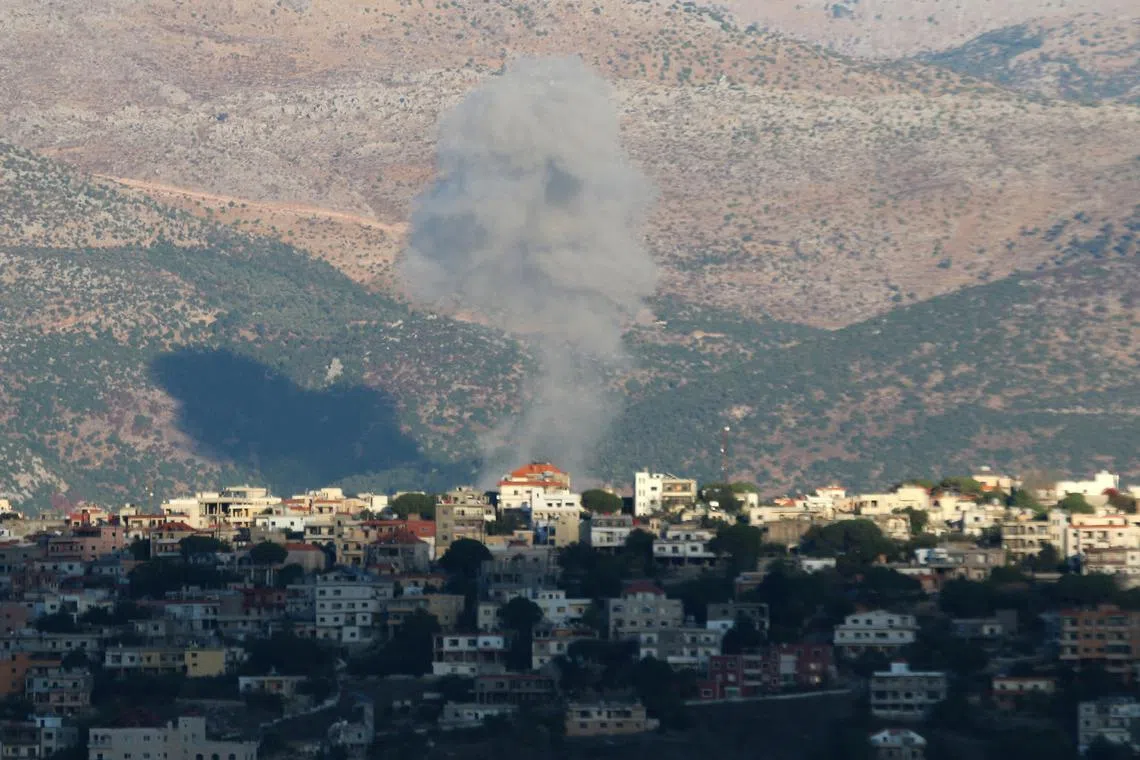Israel, Lebanon trade missile fire; plot to assassinate PM Netanyahu foiled
Sign up now: Get ST's newsletters delivered to your inbox

Smoke rises from the Lebanese town of Khiam amid ongoing cross-border hostilities between Hezbollah and Israeli forces.
PHOTO: REUTERS
Follow topic:
JERUSALEM – Israel and the Lebanese militia group Hezbollah traded cross-border attacks overnight, continuing a pattern of strikes after two extraordinary days in which hand-held devices belonging to Hezbollah members exploded, killing over 30 and wounding thousands of others.
Hezbollah fired around 10 missiles towards the Mount Hermon area of the Israeli-occupied Golan Heights, where Israel has key surveillance, espionage and air defence installations.
Two anti-tank missiles fired from Lebanon towards the Upper Galilee region of Israel, meanwhile, injured eight people, six lightly and two more seriously, according to Kan, Israel’s public broadcaster.
Israel responded by striking infrastructure belonging to Hezbollah at six sites, as well as a weapons storage facility near the town of Khiam in southern Lebanon.
The sophisticated attacks on Hezbollah’s communications equipment have sown disarray in Lebanon
At least 20 people were killed and more than 450 injured on Sept 18 in Beirut’s suburbs and the Bekaa Valley when their hand-held radios that had been covertly turned into mini-bombs exploded.
The previous day, hundreds of pagers – used by Hezbollah to evade mobile phone surveillance – exploded at once, killing 12 people
Israel has not commented directly on the attacks, but multiple security sources have said was carried out by its spy agency Mossad.
Israel says its conflict with Hezbollah, like its war in Gaza against the Palestinian militant group Hamas, is part of a wider regional confrontation with Iran, which sponsors both groups, as well as armed movements in Syria, Yemen and Iraq.
Assassination plot
On Sept 19, Israeli security forces announced that an Israeli businessman was arrested in August
Last week, Shin Bet uncovered what it said was a plot by Hezbollah to assassinate former defence minister Moshe Ya’alon.
Israel has been accused of assassinations, including blasts in Tehran that killed the leader of Hamas and in a Beirut suburb that killed a senior Hezbollah commander within hours of each other in July.
Despite the events of the past few days, a spokeswoman for the UN peacekeeping mission in southern Lebanon said the situation along the frontier had “not changed much in terms of exchanges of fire between the parties”.
“There was an intensification last week. This week, it is more or less the same. There are still exchanges of fire. It is still worrying, still concerning, and the rhetoric is high,” Ms Andrea Tenenti, the spokeswoman said.
Israel and Hezbollah have been exchanging fire across the Israeli-Lebanon border in parallel with the war Israel has waged in Gaza against Hamas, whose fighters attacked Israel on Oct 7
Tens of thousands of people have had to flee the Israel-Lebanon border area on both sides.
Shifting focus
On Sept 18, Israeli Defence Minister Yoav Gallant said the war that Israel has been waging in Gaza since last October, after Hamas-led gunmen stormed communities in southern Israel, was moving into a new phase, with the focus now shifting to the northern border.
He said more military units and resources were being sent to the border.
According to Israeli officials, the forces being deployed to the border include the 98th Division, an elite formation that includes commando and paratroop elements that has been fighting in Gaza.
Hezbollah launched missile barrages on Israel on the day after the Oct 7 attack by Hamas. Since then, there has been a constant exchange of fire that neither side has allowed to escalate into a full-scale war. REUTERS

